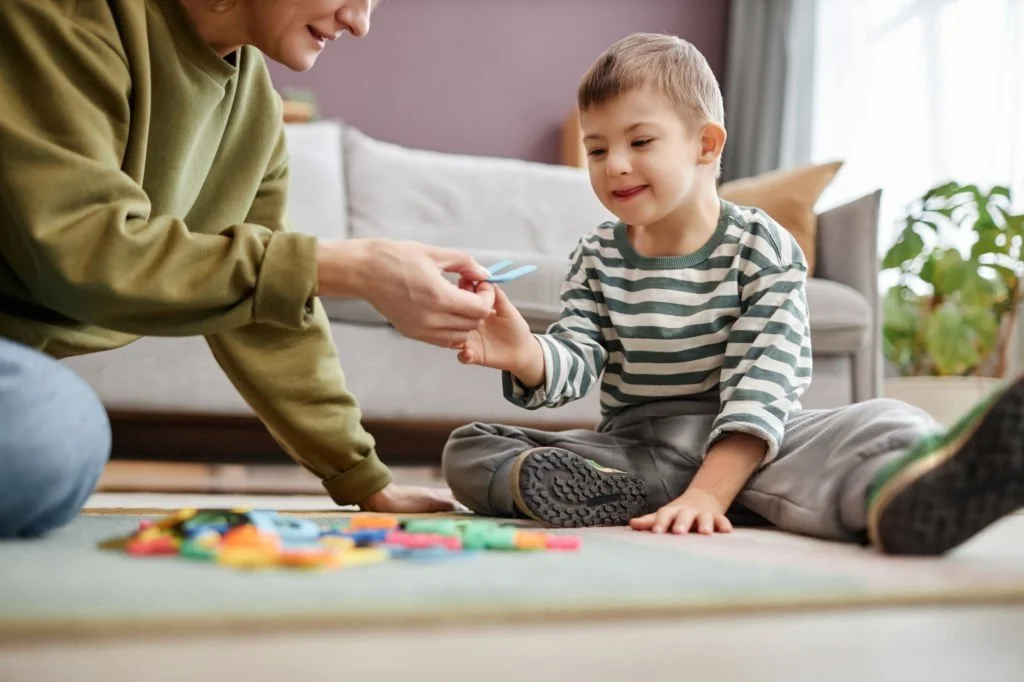Early Childhood Intervention (NDIS and Private)
What is Early Childhood Intervention?
Early Childhood Intervention (ECI) refers to intervention with young children, often under the age of 9. Servicing focuses on developing basic skills such as social-emotional reciprocity, positive play, relationships with caregivers and peers, and age-appropriate communication. Depending on the type of service being delivered to the child, intervention will also focus on providing coping skills to better manage challenges such as anxiety, difficulties with attention, changes in routine, and behavioural difficulties.
Together Care Australia delivers Psychology and Positive Behaviour Support services to children privately or to those accessing ECI through the NDIS. Servicing is holistic and family-centred, and can be delivered in numerous settings such as the home and education environments (e.g. childcare, preschool and school). Intervention is tailored to the child’s individual needs and goals, and utilises appropriate play-based therapy techniques to ensure the child feels as comfortable as possible engaging.
Accessing ECI Services through the NDIS
Whilst individuals over 9 require evidence of a permanent disability to access the NDIS, children under 9 only need evidence of a developmental delay or disability to access ECI.
Step 1 - Contact your local Early Childhood Partner: These are organisations funded by the NDIS to help families access supports for young children. The designated NDIS Early Childhood Partner in the Sutherland Shire and St George areas is Lifestart.
Phone: 1800 953 390
Email: PITC.Lifestart@ndis.gov.au
Website: lifestart.org.au
Step 2 - Initial Meeting and Support: The Early Childhood Partner will meet with you and learn about your child’s needs, strengths, and challenges. They may offer:
Short-term early intervention supports (you don’t need an NDIS plan for this)
Referrals to local therapists or services (like us)
Advice and resources to help your child’s development
Step 3 - Apply for NDIS Access (if needed): If your child needs longer-term or more intensive support, the Early Childhood Partner will help you:
Gather information (e.g. reports or observations which we can provide)
Complete an NDIS Access Request
If your child is eligible, they will receive an individualised NDIS plan with funded supports.
Who could benefit from Early Childhood Intervention?
Children may benefit from ECI if they are:
Displaying developmental concerns such as slower progress in communication, mobility and self-care.
Struggling to manage and express their emotions appropriately.
Finding it hard to play, engage, or interact with others, including their peers.
Experiencing emotional, social or behavioural challenges.
Experiencing challenging life events such as parental separation, relocation, bullying, or trauma.
Showing signs of, or are diagnosed with, an emerging condition such as ASD, ADHD, or GDD.
Therapy Techniques.
We understand that experiencing big emotions for the first time can be overwhelming for little ones. Using play-based therapy techniques allows children to open up about how they are feeling in ways that are comfortable and known to them. Practitioners will often use multiple forms of play therapy that are suited to the child’s age, functioning, and needs. These may include:
Art-Based Play Therapy
Art-Based Play Therapy uses creative mediums such as drawing, painting, or crafting to help children express emotions, thoughts, and memories that may be difficult to verbalize. This technique is particularly useful for children with limited language abilities or those processing trauma. The art process becomes a bridge to understanding the child’s inner world and supporting emotional healing.
Role Play
Role Playing involve the use of dolls, puppets, costumes, or props to help children act out real-life situations, fantasies, or fears. This technique is especially useful in exploring family dynamics, social interactions, and internal conflicts. It encourages emotional expression and helps develop empathy, problem-solving, and communication skills.
Therapeutic Games
Therapeutic Games are structured activities that incorporate emotional and behavioural learning into fun, engaging formats. Games can help children practice skills like turn-taking, emotional regulation, or conflict resolution. They are particularly effective for children with autism, ADHD, or anxiety, as they make therapeutic goals accessible in a playful and motivating way.
Child-Centred Play Therapy (Non-Directive)
Child-Centred Play Therapy (Non-Directive) allows the child to lead the session by choosing their own play activities and pace. This approach builds a trusting therapeutic relationship, giving the child a safe and supportive environment to express emotions and explore their experiences without pressure or judgment. Practitioners will follows the child’s lead, reflecting feelings and validating their actions to encourage emotional growth and self-confidence.
Filial Therapy
Filial Therapy involves training and supporting parents to conduct therapeutic play sessions with their child. This method strengthens the parent-child relationship, promotes emotional security, and empowers parents to respond more effectively to their child’s emotional and developmental needs. It fosters connection and trust, extending therapeutic benefits into the home environment.
Cognitive-Behavioural Play Therapy (CBPT)
Cognitive-Behavioural Play Therapy (CBPT) combines traditional cognitive-behavioural strategies with age-appropriate play techniques. Children learn to recognise and manage their thoughts, feelings, and behaviours through games, storytelling, and guided discussions. CBPT is particularly effective for children with anxiety, depression, or behavioural issues, as it helps them develop coping strategies in a developmentally appropriate way.
Referral Types and Cost
ECI can be accessed and paid for privately or through the NDIS. Private ECI Psychology is charged at $200/hour. Psychology and Behaviour Support ECI services under the NDIS are charged at the NDIS rate of $232.99/hour, with travel charged at $116.49/hour. The following referral types are available:
Psychology (NDIS and Private)
Psychological Counselling
Mental Health Diagnostic Assessment
Development of a Recommendation Report
Positive Behaviour Support (NDIS)
Development of a Behaviour Support Plan (BSP) only
Development and Implementation of a BSP
Implementation of a BSP developed by another provider (within 12 months of creation)
Development of a Recommendation Report only




